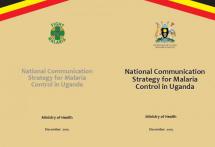National Communication Strategy for Malaria Control in Uganda
Malaria prevention hinges on individual, family and community actions, adaptation of prevention,control and treatment options provided by the Ministry of Health. Communities need to be provided with correct and consistent information on the disease in order for them to take up these options. Communication is therefore essential for positive outcomes of all options offered in malaria prevention and control. This communication strategy has been developed to guide all actors in the prevention, control, and treatment of malaria.
In the past, Uganda lacked a harmonized communication framework of addressing the malaria problem. Communication was characterized by piece-meal strategies focused on specific areas of malaria control such as malaria in pregnancy. There was no common framework to guide the different stakeholders. Thus, partners developed their own messages and materials to suit their requirements.
This strategy is therefore, designed to harmonize communication activities of all stakeholders involved in the fight against malaria. The communication strategy offers a platform to be used by all stakeholders to avoid the diverse and occasionally confusing messages coming from the different actors. The strategy is aligned to support the new Malaria Reduction Strategy 2014-2020 and consolidate the gains recorded in the Malaria Indicator Survey 2014.
Source: Uganda National Malaria Control Program
Date of Publication: March 25, 2019
SIMILIAR RESOURCES
Tools
Examples
- SBCC for Malaria in Pregnancy: Strategy Development Guidance
- The Strategic Framework for Malaria Social and Behaviour Change Communication 2018-2030
- Integrated Management Strategy for Dengue Prevention and Control
- Promoting Quality Malaria Medicines Through SBCC: An Implementation Kit
- Social and Behavior Change Considerations for Areas Transitioning from High and Moderate to Low, Very Low and Zero Malaria Transmission
- CDC’s Guiding Principles for Public-Private Partnerships: A Tool to Support Engagement to Achieve Public Health Goals
- Social Franchising: Improving Quality and Expanding Contraceptive Choice in the Private Sector
- WHO Water, Sanitation and Hygiene Strategy 2018-2025
- How Businesses Can Invest in Women and Realize Returns
- Dengue: Guidelines for Diagnosis, Treatment, Prevention and Control
- Liberia Malaria Communication Strategy 2016-2020
- Communication and Social Mobilization for Malaria Prevention and Control in Myanmar
- Plan de Communication pour la Lutte Contre le Paludisme, 2013-2017, rev 2016
- Malaria-themed Radio Magazine Program
- Advocacy, Communication and Social mobilisation Action Plan for Malaria Elimination in Swaziland, 2015-2017

